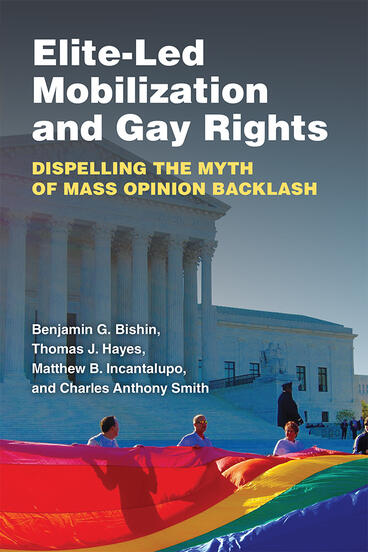Elite-Led Mobilization and Gay Rights
Dispelling the Myth of Mass Opinion Backlash
Grassroots America supports LBGTQ rights even when leaders do not
Description
Media and scholastic accounts describe a strong public opinion backlash—a sharply negative and enduring opinion change—against attempts to advance gay rights. Academic research, however, increasingly questions backlash as an explanation for opposition to LGBT rights. Elite-Led Mobilization and Gay Rights argues that what appears to be public opinion backlash against gay rights is more consistent with elite-led mobilization—a strategy used by anti-gay elites, primarily white evangelicals, seeking to prevent the full incorporation of LGBT Americans in the polity in order to achieve political objectives and increase political power. This book defines and tests the theory of Mass Opinion Backlash and develops and tests the theory of Elite-Led Mobilization by employing a series of online and natural experiments, surrounding the U.S. Supreme Court rulings in Obergefell v. Hodges and United States v. Windsor, and President Obama’s position change on gay marriage. To evaluate these theories, the authors employ extensive survey, voting behavior, and campaign finance data, and examine the history of the LGBT movement and its opposition by religious conservatives, from the Lavender Scare to the campaign against Trans Rights in the defeat of Houston’s 2015 HERO ordinance. Their evidence shows that opposition to LGBT rights is a top-down process incited by anti-gay elites rather than a bottom-up reaction described by public opinion backlash.
Benjamin George Bishin is Professor of Political Science at the University of California, Riverside
Thomas J. Hayes is Associate Professor of Political Science at the University of Connecticut
Matthew B. Incantalupo is Assistant Professor of Political Science at Yeshiva University
Charles Anthony Smith is Professor of Political Science and Law at the University of California, Irvine
Reviews
“This team of fine authors takes on the recent cycle of change over marriage equality through an important historical lens, illustrating that legislative attacks and state ballot initiatives in response to early baby steps towards inclusion are unrelated to the apparent, nearly monotonic, shift in the direction of acceptance that ultimately resulted in change. Rather than being a product of mass opinion change, backlash is—much like Horowitz illustrated with ethno-nationalism—a tool of political elites to enhance power, neither rooted in nor particularly intended to benefit the mobilized anger-crowd. This is an important book, relevant to so many additional issues, and it will have a lasting impact.”
—Gary Segura, UCLA Luskin School of Public Affairs
- Gary Segura
“. . . finally, a book that successfully moves us—academics and general readers—to the next stage in the long-standing, myth-riddled, often-tautological discussion of backlash.”
- Scott W. Barclay
—Scott W. Barclay, Arizona State University
“What if ‘political backlash’ isn’t a thing? What if there is no public opinion evidence of political backlash? What if, instead, the hype of a ‘political backlash’ is a strategic tool used by a few to gain political power? The premise of this research—that ‘anti-gay politics’ is not about grassroots ideological outrage but about elites mobilizing to gain political power—deserves serious consideration by all scholars who profess expertise in the fields of public opinion, interest group politics, political strategy, and, unsurprisingly, religion and politics.”
—Angelia R. Wilson, The University of Manchester
- Angelia R. Wilson
“This important book dispatches with the commonly held assumption that pursuit of rights by minority groups leads to backlash by the public.”
- Jami Taylor
—Jami Taylor, University of Toledo
“The authors provide a wealth of multi-method empirical evidence that systematically dismantles the conventional wisdom that LGBT activists should not push too fast or too hard. The findings send an unambiguous message to lesbians and gays: you do not need to wait to push for full political equality.”
—Shawn Schulenberg, Marshall University
- Shawn Schulenberg
"This book pushes scholarship to more closely consider the link between rank‐and‐file movement actors and political elites, particularly as it relates to movement‐countermovement dynamics within institutional politics. Moreover, as states introduce anti‐trans and religious freedom laws, and the U.S. Supreme Court is poised (at this time) to challenge the right to privacy—an undergirding tenet of Obergefell v. Hodges (2015) and Lawrence v. Texas (2004)—this book serves as a call to action for academics, activists, and politicians to advocate and protect (LGBTQ + ) human rights."
- Shawn Ratcliff
—Political Science Quarterly

